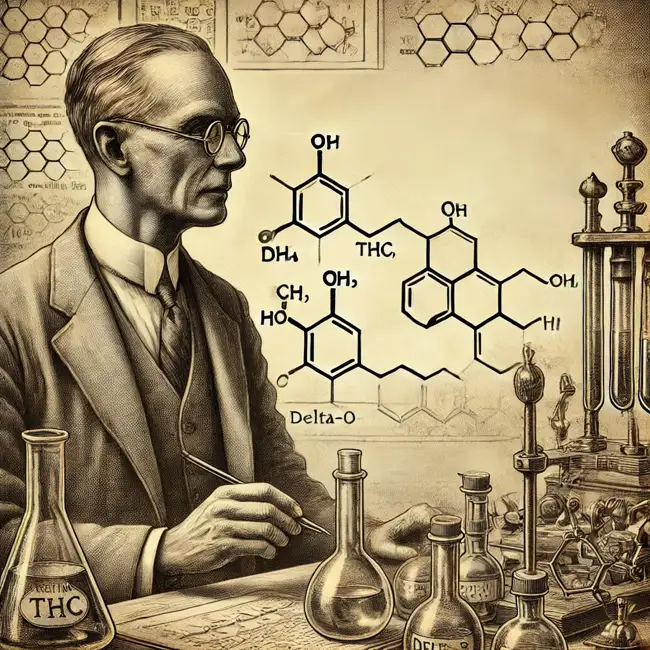Delta-8 THC Addiction and Recovery
Struggling with an addiction to Delta-8 THC? Dilworth Center in Charlotte, NC, offers specialized treatment for Delta 8 abuse. Learn more about our personalized recovery programs and start your journey to freedom.
Delta-8 THC, a cannabinoid found in hemp, has grown in popularity due to its mild psychoactive effects. However, concerns are rising regarding the potential health risks and long-term effects of Delta-8 THC use. Delta-8 withdrawal symptoms, Delta-8 safety concerns, and its impact on mental health, including anxiety, are prompting many individuals to question the substance’s use. If you’re struggling with quitting Delta-8 or dealing with the consequences of regular use, Dilworth Center offers comprehensive support to help you overcome addiction and regain control.
Understanding Delta-8 THC Addiction
Delta-8 Effects on Humans
Delta-8 THC is often considered a milder alternative to Delta-9 THC, but that does not mean it is without risk. Regular use can lead to both physical and psychological issues. Delta-8 anxiety is a common concern, with many users reporting heightened anxiety and paranoia after consumption. Prolonged use may also lead to Delta-8 withdrawal symptoms, including irritability, insomnia, and cravings. Additionally, Delta-8 effects on liver function and other organs are still being studied, with early reports suggesting potential liver toxicity and other long-term health risks.

The History of Delta-8 THC
Delta-8 THC, a cannabinoid closely related to Delta-9 THC, has been known to scientists since the early 1940s when Roger Adams first synthesized it. Despite being structurally similar to Delta-9, the primary psychoactive compound in cannabis, Delta-8 was largely overshadowed due to Delta-9’s more potent effects. Delta-8 THC produces a milder high, which led to less initial interest for recreational use. It grew more widely available in the late 2010s after changes in U.S. hemp regulations. While marketed as a legal alternative to cannabis, its safety and long-term effects remain under study (FDA, NIDA).

Modern Use of Delta-8 THC
The modern rise of Delta-8 THC began in the early 2000s but took off after the passage of the 2018 U.S. Farm Bill, which legalized hemp and its derivatives, provided they contain less than 0.3% Delta-9 THC. This legal gray area allowed Delta-8 THC, derived from hemp, to be marketed as a legal alternative to marijuana despite having psychoactive properties. Producers quickly began converting CBD (a non-psychoactive cannabinoid) into Delta-8 THC through chemical processes, making it widely available in various forms, such as gummies, vapes, and tinctures.
A Legal High, and Delta-8 Problems
Delta-8 products rapidly gained popularity, particularly in states where Delta-9 THC (the psychoactive component in cannabis) remained illegal. Advertised as a “legal high” with fewer side effects, Delta-8 drew in users who were looking for the psychoactive experience of THC without the intense effects associated with Delta-9. However, as usage increased, so did concerns about its safety and potential for abuse. Users began reporting Delta-8 problems, including anxiety, paranoia, and even withdrawal symptoms.

Delta-8 THC Addiction Issues
Health officials started raising concerns over the lack of regulation in the Delta-8 market. Since Delta-8 THC products are often synthetic and unregulated, there’s little oversight on the purity and potency of the products, which has led to cases of contamination and Delta-8 overdose. The long-term effects of Delta-8 are not well understood, but early reports have shown potential risks, including Delta-8’s effects on liver function and negative impacts on mental health.
The rise in Delta-8 use in teens is particularly troubling, as many younger users mistakenly believe that it is a safer or “natural” alternative to Delta-9 THC. This perception has contributed to the growing number of teens and young adults experiencing Delta-8 withdrawal and addiction issues.
The legal status of Delta-8 remains a topic of debate, with several states moving to ban or regulate its sale. Despite its growing popularity, concerns over Delta-8 safety and health risks continue to mount, leading to increased scrutiny from both regulators and health professionals.

Symptoms of Delta-8 THC Addiction
Delta-8 addiction shares many of the same symptoms as other THC dependencies. Users may experience cravings, irritability, and anxiety when trying to reduce or quit use. Common signs include needing larger doses to achieve the same effects, neglecting responsibilities, and continued use despite negative consequences. Delta-8 withdrawal symptoms can make quitting difficult, with users experiencing mood swings, difficulty sleeping, and increased irritability. Understanding these symptoms is the first step toward seeking treatment and beginning recovery.
The Recovery Journey
Recovery is Possible
At Dilworth Center, we provide personalized treatment programs for individuals struggling with Delta-8 THC addiction. Whether you’re facing getting off Delta-8 or managing withdrawal symptoms, our comprehensive care approach includes therapy, group support, and strategies to help you achieve lasting recovery. We address the physical and mental health effects of Delta-8 use, including its impact on anxiety and other psychological issues. With the right support, recovery from Delta-8 addiction is possible, and we’re here to guide you every step of the way.

Recovery Expectations
The journey to recovery from Delta-8 THC addiction varies for each individual but generally follows a progression as the body and mind adjust to functioning without the substance. Delta-8 withdrawal symptoms, while generally milder than those associated with Delta-9 THC or other substances, can still present significant challenges. Understanding the stages of recovery can help set realistic expectations and provide a roadmap for the individual and their support network. At Dilworth Center, we guide our patients through these phases, offering tailored support to help them overcome the physical and psychological hurdles of quitting Delta-8.

First 30 Days: Initial Adjustment (After Medical Detox)
In the first month after stopping Delta-8, people may experience withdrawal symptoms such as irritability, mood swings, insomnia, anxiety, and cravings. If necessary, individuals begin outpatient treatment at Dilworth Center after completing a medically supervised detox with one of our trusted partners. Please contact Dilworth Center for more information.

Days 31-90: Building a Foundation for Delta-8 THC Recovery
During the second and third months, the body continues to recover, and the worst of the physical withdrawal symptoms generally fade. People may notice improvements in mood and energy levels as the brain begins to return to its natural balance. However, some lingering psychological symptoms such as Delta-8 anxiety and cravings may persist. During this phase, therapy focuses on developing coping strategies to manage stress, anxiety, and emotional triggers that could lead to relapse. Building a healthy routine is crucial during this stage, as it helps maintain momentum and reinforces positive habits.

Days 90-180: Strengthening Recovery Skills
By the third to sixth month, individuals typically feel more stable and in control of their recovery. Physical symptoms should have largely dissipated, but psychological challenges like stress, anxiety, and occasional cravings might still arise. Therapy at this stage focuses on relapse prevention and reinforcing healthy behavioral patterns. Patients may work on improving relationships, setting personal goals, and addressing any underlying mental health issues like anxiety and addiction that could impact their recovery. Support groups and family therapy also play a critical role in providing ongoing emotional support and accountability.

Days 180-365: Achieving Long-Term Goals
As individuals approach their first full year of recovery, the focus shifts to maintaining long-term sobriety and continuing to build a fulfilling, drug-free life. By this stage, the physical dependency on Delta-8 has typically resolved, but the psychological aspects of addiction may still require attention. Therapy during this phase emphasizes personal growth, setting long-term goals, and fostering healthy relationships. Individuals might also work on addressing the long-term effects of Delta-8 on mental health, such as anxiety or cognitive impairment. Relapse prevention plans remain a cornerstone of recovery, and patients are encouraged to engage in ongoing therapy, support groups, and healthy lifestyle practices to stay on track.
Beyond the First Year
Recovery extends beyond the initial phases of quitting Delta-8. After the first year, individuals often focus on rebuilding their lives and maintaining a healthy lifestyle free from dependency. Ongoing therapy, participation in support groups, and setting new personal goals help maintain long-term sobriety. At Dilworth Center, we provide continued support and resources to help individuals thrive beyond their first year of recovery.

Family Support for Delta-8 THC Addiction Recovery
Family Support
At Dilworth Center, we recognize the essential role that family plays in the recovery journey from Delta-8 THC addiction. Addiction impacts not just the individual but also their loved ones, often creating strain within family relationships. Our family support programs are designed to help families understand the complexities of Delta-8 addiction, rebuild trust, and equip them with the tools to offer meaningful support. Through open communication and guided therapy, we work to foster a supportive environment that strengthens the recovery process and helps achieve long-term sobriety.


Understanding Delta-8 Addiction and Its Impact on Families
Delta-8 THC addiction can create confusion and emotional stress for family members, especially since the substance is often marketed as a legal and “safe” alternative to Delta-9 THC. Many families may not fully understand the potential risks, including withdrawal symptoms, anxiety, and other Delta-8 problems like its effects on mental health. Families may witness their loved ones experiencing mood swings, financial difficulties, and social withdrawal, all of which can lead to emotional exhaustion and frustration. Without proper education and support, these challenges can strain relationships, causing tension and distancing within the household.
Involving the Family in the Recovery Process
At Dilworth Center, we prioritize family involvement throughout the recovery process. Our programs include family therapy sessions that provide a safe space for open discussions, allowing loved ones to express their concerns, share their feelings, and learn how to effectively support their family member’s recovery from Delta-8 THC addiction. These sessions focus on rebuilding communication, trust, and healthy boundaries. By involving the family, we help create a support system that strengthens the individual’s recovery and equips families with strategies to help maintain long-term sobriety. Family involvement is crucial to the success of recovery, and we are here to guide both the individual and their loved ones every step of the way.

Dilworth Center Services
Recovering with Dilworth Center
At Dilworth Center, we understand the unique challenges associated with Delta-8 addiction. Our recovery programs are tailored to address both the physical and psychological aspects of addiction, helping individuals overcome the withdrawal symptoms, anxiety, and health risks associated with long-term Delta-8 use. Whether you’re dealing with quitting Delta-8 or managing its effects on your mental health, our experienced team is here to support you throughout your recovery journey. With a focus on evidence-based treatment, family involvement, and ongoing support, Dilworth Center provides a pathway to lasting sobriety and improved well-being.

Take the First Step Toward Lasting Delta-8 Recovery
Are you ready to overcome Delta-8 THC addiction? Our expert team at Dilworth Center is here to support you on your path to sobriety. Discover personalized treatment plans that empower long-term recovery. Don’t wait—reach out today and start your journey toward a healthier, Delta-8 THC-free life.

Dilworth Center Treatment Programs

Adult Intensive Outpatient Program (IOP) for Delta-8 THC Addiction
For individuals struggling with Delta-8 THC addiction, Dilworth Center offers an effective outpatient rehab option through our Adult Intensive Outpatient Program (IOP). Our outpatient drug rehab provides a flexible yet structured approach to recovery, allowing individuals to maintain their daily responsibilities while receiving high-quality care. Through personalized therapy sessions, group counseling, and educational resources, we help individuals address the physical and psychological challenges associated with Delta-8 THC dependency.
Our outpatient drug and alcohol treatment program focuses on providing the tools and support needed to manage cravings, cope with withdrawal symptoms, and build a solid foundation for long-term recovery. Our team of experienced professionals works closely with each patient to develop an individualized treatment plan that addresses both the physical effects of Delta-8 and any underlying mental health issues, such as anxiety. At Dilworth Center, we are committed to helping individuals overcome Delta-8 addiction and achieve lasting sobriety.

Young Adult Intensive Outpatient Program (IOP) for Delta-8 THC Addiction
For young adults dealing with Delta-8 THC addiction, Dilworth Center offers specialized treatment through our Young Adult Intensive Outpatient Program (IOP). As a nonprofit provider with over 35 years in Charlotte, Dilworth Center offers specialized outpatient programs designed for young adults in recovery. Our drug rehab programs for young adults are designed to address the specific challenges faced by this age group, including peer pressure, emotional struggles, and the impact of Delta-8 on mental health.
Our young adult rehab programs combine individual therapy, group counseling, and life skills development to help young adults overcome the physical and psychological effects of Delta-8 THC. We tailor our approach to meet the unique needs of each individual, ensuring that they receive the guidance, support, and tools needed for lasting recovery. At Dilworth Center, we are committed to helping young adults reclaim their lives and build a future free from addiction.

Adolescent Intensive Outpatient Program (IOP) for Delta-8 THC Addiction
For teenagers struggling with Delta-8 THC addiction, Dilworth Center offers a specialized drug rehab for minors through our Adolescent Intensive Outpatient Program (IOP). This program is designed to address the unique challenges teens face when dealing with substance use, offering a comprehensive approach to recovery while allowing them to continue their school and social lives.
Our Adolescent Intensive Outpatient Program (IOP) offers evidence-based care tailored for teens, with licensed staff and strong family involvement. Our program focuses on helping teenagers understand the risks of Delta-8 THC, manage cravings, and cope with the emotional challenges of addiction. At Dilworth Center, we aim to create a supportive and nurturing environment that empowers teens to overcome their addiction and develop healthier habits for the future.
Our rehabs for teenagers are tailored to address both the psychological and physical aspects of addiction, ensuring that young people have the resources and support needed for long-term recovery. Through therapy, education, and family engagement, we help teens reclaim control of their lives and build a brighter, drug-free future.

Family Program for Delta-8 THC Addiction
At Dilworth Center, we understand that Delta-8 THC addiction affects not only the individual but also their entire family. Our Family Program is designed to provide essential family addiction support, helping loved ones navigate the emotional challenges that arise when dealing with addiction. We believe that involving the family in the recovery process is crucial for long-term success, and our program is tailored to educate, support, and empower families as they work through the complexities of addiction.
Our program includes comprehensive family therapy for drug addiction, where family members can come together to address the impact Delta-8 THC has had on their relationships. These therapy sessions, guided by a dedicated family addiction therapist, focus on open communication, healing, and creating a supportive home environment that fosters recovery. By addressing issues like trust, emotional health, and boundaries, families are better equipped to support their loved one’s journey to sobriety.
Through family addiction support services at Dilworth Center, families gain the knowledge and tools they need to help their loved one achieve lasting recovery from Delta-8 addiction. Whether through family therapy sessions or educational workshops, we aim to strengthen family bonds and foster a unified approach to overcoming addiction.

Mental Health Program (Dual Diagnosis) for Delta-8 THC Addiction
At Dilworth Center, we understand the strong connection between addictions and mental health, particularly when it comes to Delta-8 THC addiction. Many individuals struggling with Delta-8 also experience co-occurring mental health conditions such as anxiety or depression. Our specialized Dual Diagnosis Program is designed to treat both the addiction and the underlying mental health issues simultaneously, ensuring a comprehensive approach to recovery.
Anxiety and addiction often go hand in hand, especially with substances like Delta-8 THC, which is sometimes used to self-medicate for stress or anxiety. Unfortunately, prolonged use can worsen mental health symptoms and lead to dependency. Our program addresses the root causes of both tanxiety andaddiction, providing therapeutic interventions that help individuals develop healthier coping strategies without relying on substances.
For individuals dealing with depression and substance use, Delta-8 THC can be particularly dangerous. While it may offer short-term relief, it can ultimately exacerbate symptoms of depression, leading to a cycle of addiction and worsening mental health. At Dilworth Center, we offer tailored treatment plans that focus on breaking this cycle, and helping individuals regain control of their mental health while overcoming their addiction.

Relapse Prevention Program for Delta-8 THC Addiction
At Dilworth Center, we understand that maintaining sobriety after overcoming Delta-8 THC addiction requires ongoing support and effective planning. Our relapse prevention program is designed to equip individuals with the tools and strategies necessary to stay on the path to long-term recovery. We work closely with each person to develop personalized relapse prevention plans that address their unique triggers and challenges, helping them navigate life without returning to substance use.
Our program emphasizes practical relapse prevention strategies, such as identifying high-risk situations, building a strong support network, and creating healthy coping mechanisms for stress and anxiety. These strategies are tailored to the individual’s needs, ensuring they have a solid plan io avoid relapse and maintain their recovery.
Through therapy and continued support, our relapse prevention approach empowers individuals to manage cravings, reduce the risk of relapse, and reinforce the skills they have learned during treatment. At Dilworth Center, we are committed to helping you build a future free from the grips of Delta-8 THC addiction.










